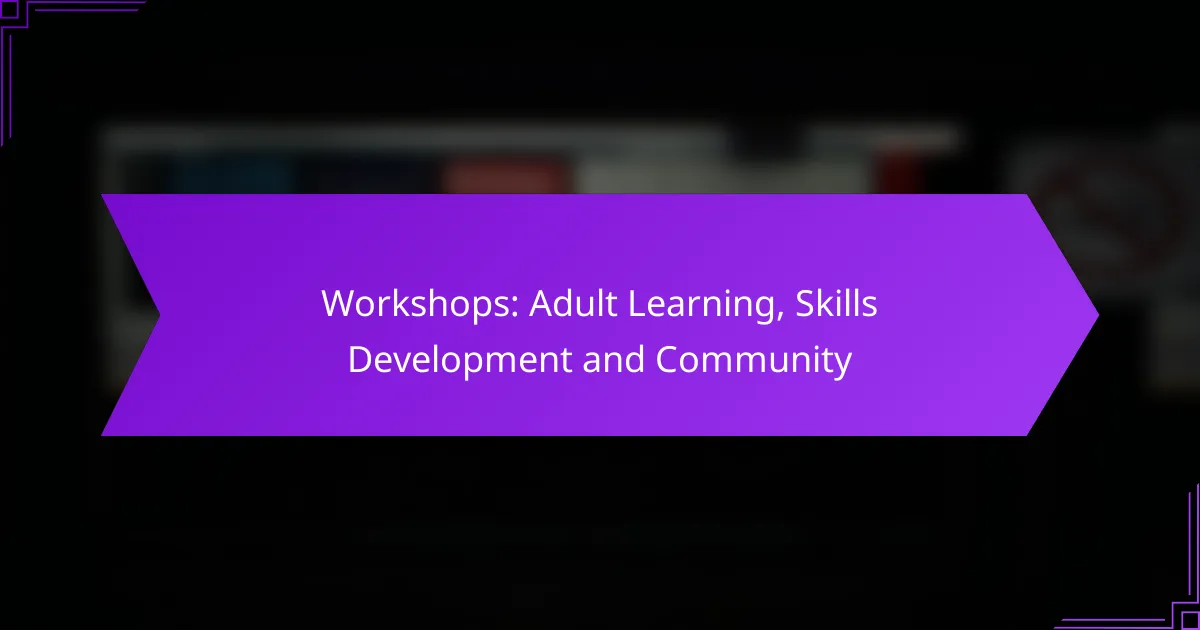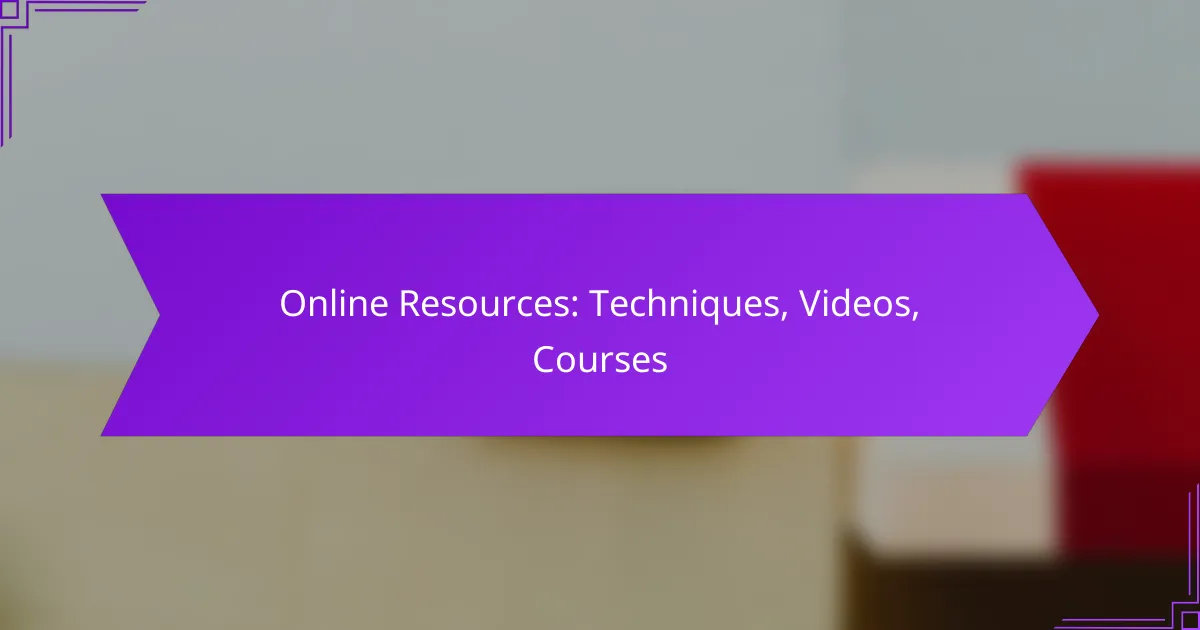Adult learning workshops in urban settings offer valuable opportunities for skill enhancement and community engagement. By participating in these workshops, individuals can acquire new competencies while building connections with others in their community. Tailoring your choice of workshop to your specific learning goals will ensure a more effective and fulfilling experience.

What are the benefits of adult learning workshops in urban areas?
Adult learning workshops in urban areas provide numerous advantages, including skill enhancement, networking opportunities, and community engagement. These workshops cater to diverse populations, helping individuals acquire new competencies while fostering connections within their communities.
Skill enhancement
Adult learning workshops focus on practical skills that are relevant to the local job market. Participants can expect to gain knowledge in areas such as technology, finance, and vocational training, which can lead to better job prospects and career advancement.
Workshops often include hands-on activities, allowing learners to practice new skills in real-world scenarios. For example, a workshop on digital marketing may involve creating social media campaigns, providing immediate application of learned concepts.
Networking opportunities
These workshops serve as a platform for participants to meet like-minded individuals and professionals in their fields. Networking can lead to job referrals, mentorships, and collaborations, which are essential for career growth.
Urban workshops often attract a diverse group of attendees, increasing the chances of forming valuable connections. Engaging with others in the same learning environment can foster relationships that extend beyond the workshop itself.
Community engagement
Adult learning workshops promote community engagement by bringing together individuals from various backgrounds to learn and grow together. This shared experience can strengthen community ties and encourage collaboration on local projects.
Additionally, workshops often address community-specific issues, such as financial literacy or health awareness, empowering participants to make informed decisions that benefit their neighborhoods. Engaging in these workshops can lead to increased civic participation and a stronger sense of belonging.
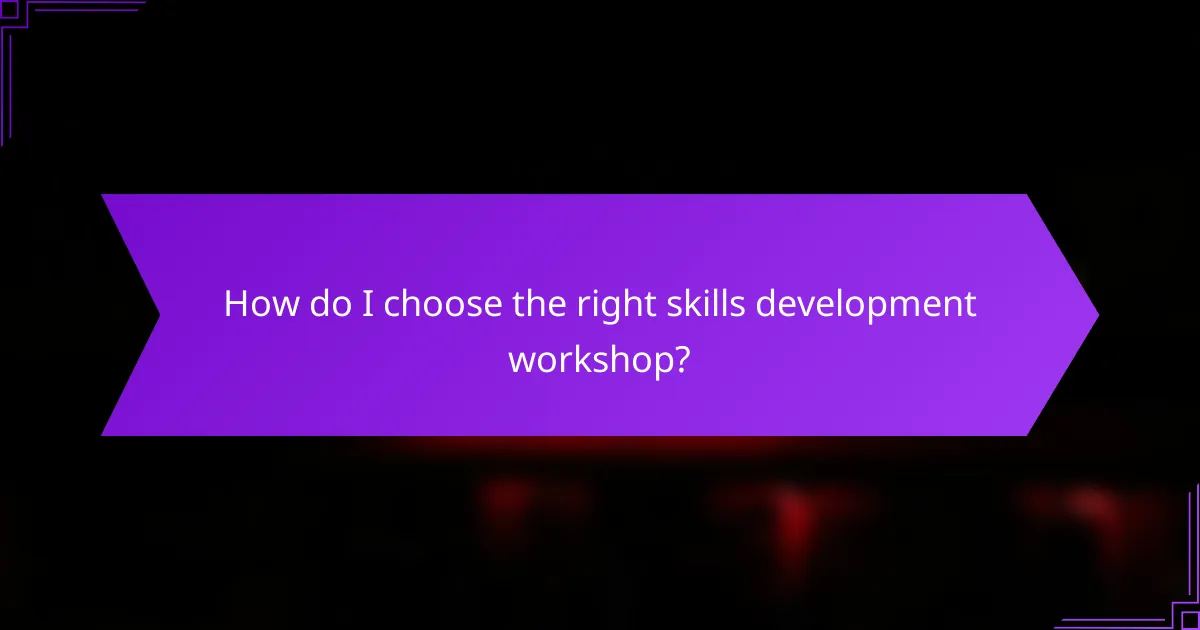
How do I choose the right skills development workshop?
To choose the right skills development workshop, start by identifying your specific learning goals and the skills you wish to enhance. This will help you narrow down options that align with your objectives and ensure a more effective learning experience.
Assess learning objectives
Begin by clearly defining what you want to achieve from the workshop. Are you looking to gain new technical skills, improve soft skills, or perhaps explore a new field? Having specific objectives will guide your selection process.
Consider creating a list of desired outcomes. For example, if you want to improve your public speaking, look for workshops that specifically focus on communication techniques and presentation skills.
Evaluate instructor qualifications
The qualifications and experience of the instructor can significantly impact the quality of the workshop. Research their background, including their professional experience, educational credentials, and any relevant certifications.
Look for reviews or testimonials from previous participants to gauge the instructor’s effectiveness. A knowledgeable instructor can provide valuable insights and practical applications that enhance your learning experience.
Consider workshop format
Workshops can vary in format, including in-person, online, or hybrid options. Consider which format best suits your learning style and schedule. In-person workshops may offer more hands-on experience, while online formats can provide flexibility.
Additionally, think about the workshop’s duration and structure. Short, intensive workshops may be beneficial for quick skill acquisition, while longer programs might offer deeper exploration and practice opportunities. Ensure the format aligns with your personal preferences and availability.
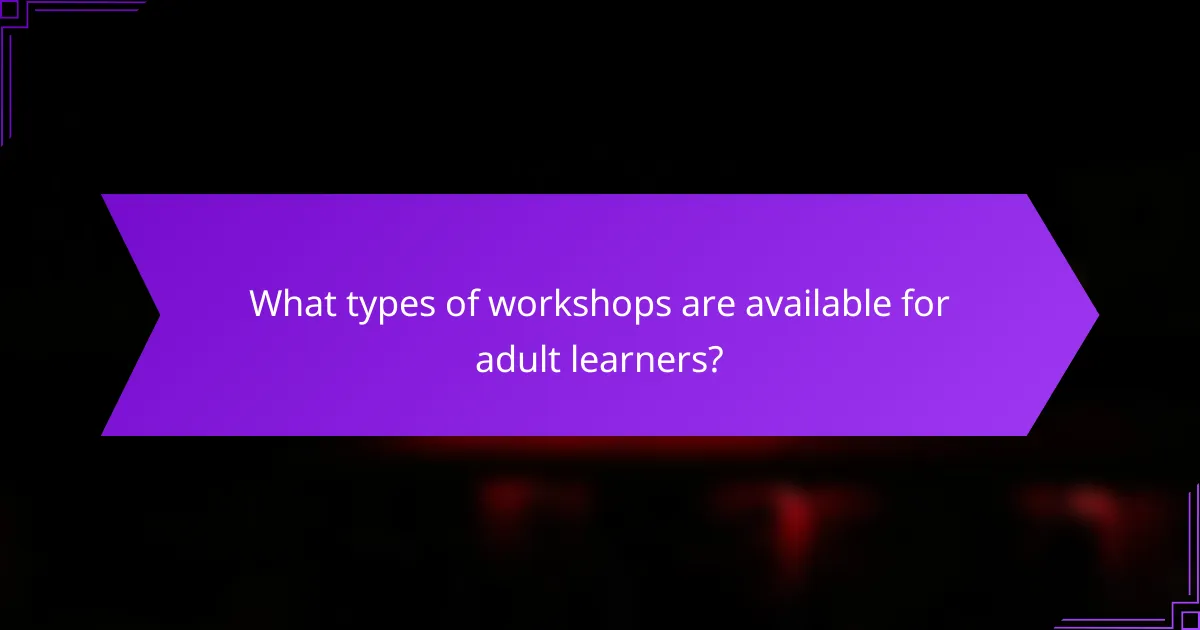
What types of workshops are available for adult learners?
Adult learners can choose from a variety of workshops tailored to enhance their skills and knowledge. These workshops typically focus on technical skills, creative arts, and business development, catering to diverse interests and career goals.
Technical skills workshops
Technical skills workshops are designed to equip participants with practical abilities in areas such as IT, engineering, and trades. These sessions often include hands-on training, allowing learners to apply concepts in real-world scenarios.
Common topics include coding, cybersecurity, data analysis, and software development. Participants may benefit from industry-recognized certifications that can enhance their employability and professional growth.
Creative arts workshops
Creative arts workshops focus on fostering artistic expression through various mediums such as painting, photography, writing, and music. These workshops encourage participants to explore their creativity while developing specific techniques and skills.
Workshops may range from beginner to advanced levels, often culminating in a showcase of participants’ work. Engaging in creative arts can also provide therapeutic benefits, enhancing overall well-being and community connection.
Business and entrepreneurship workshops
Business and entrepreneurship workshops aim to provide adult learners with the knowledge and skills necessary to start and manage their own businesses. Topics often include business planning, marketing strategies, financial management, and legal considerations.
These workshops may feature guest speakers from successful startups or established businesses, offering insights and networking opportunities. Participants can expect to leave with actionable plans and a clearer understanding of the entrepreneurial landscape.
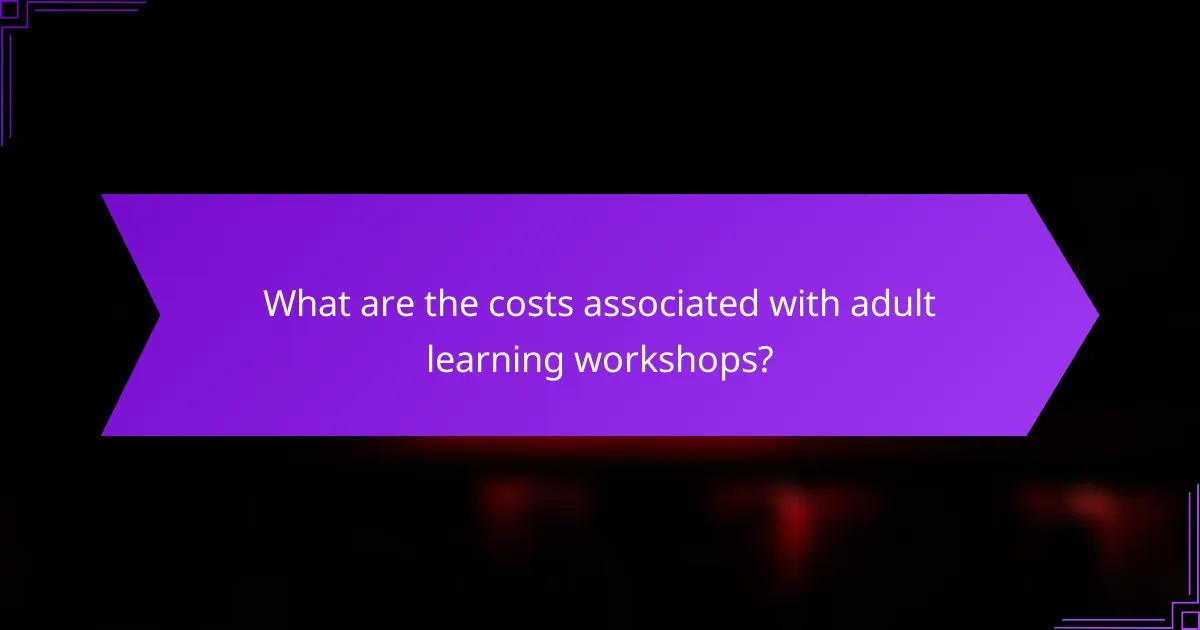
What are the costs associated with adult learning workshops?
The costs of adult learning workshops can vary significantly based on factors such as location, duration, and the type of skills being taught. Generally, participants should expect to pay anywhere from a few hundred to several thousand dollars, depending on the workshop’s depth and resources provided.
Average pricing ranges
Adult learning workshops typically range from approximately $100 to $2,000. Short, introductory workshops may cost between $100 and $500, while more comprehensive programs that offer certifications or specialized training can range from $500 to $2,000 or more. Prices may also differ based on the provider, with community colleges often offering lower rates compared to private institutions.
Additionally, some workshops may charge fees for materials or additional resources, so it’s essential to inquire about the total cost upfront. Comparing multiple options can help identify the best value for the desired learning outcomes.
Funding options and scholarships
Many adult learning workshops offer funding options and scholarships to help offset costs. Participants should explore local community programs, government grants, or employer-sponsored training initiatives that may provide financial assistance. Some workshops may also have their own scholarship programs aimed at making education more accessible.
It’s advisable to check eligibility requirements and application deadlines for any funding opportunities. Additionally, some organizations may allow payment plans, making it easier to manage expenses over time. Always ask about available financial aid options when considering a workshop.
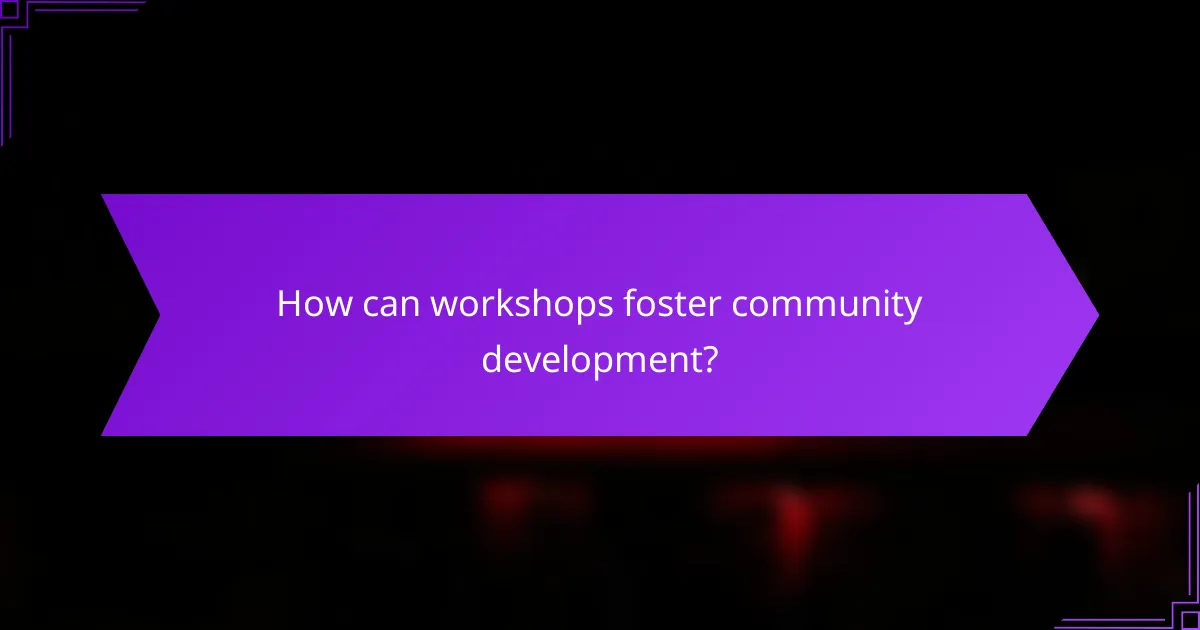
How can workshops foster community development?
Workshops can significantly enhance community development by providing a platform for skill sharing, collaboration, and local engagement. They create opportunities for residents to learn from each other, build relationships, and address community needs collectively.
Building local partnerships
Workshops are effective in building local partnerships by connecting various stakeholders, including residents, businesses, and organizations. These collaborations can lead to resource sharing, joint initiatives, and a stronger sense of community ownership.
For example, a workshop on sustainable gardening could involve local farmers, environmental groups, and residents, fostering relationships that extend beyond the event. Consider reaching out to local businesses for sponsorship or support, which can enhance the workshop’s impact and visibility.
Encouraging volunteerism
Workshops can encourage volunteerism by engaging participants in community service projects and initiatives. When individuals see the direct impact of their contributions, they are more likely to continue volunteering and inspire others to do the same.
For instance, a workshop focused on community clean-up efforts can motivate attendees to take part in ongoing maintenance activities. To maximize volunteer involvement, highlight the benefits of participation, such as skill development, networking opportunities, and personal fulfillment.
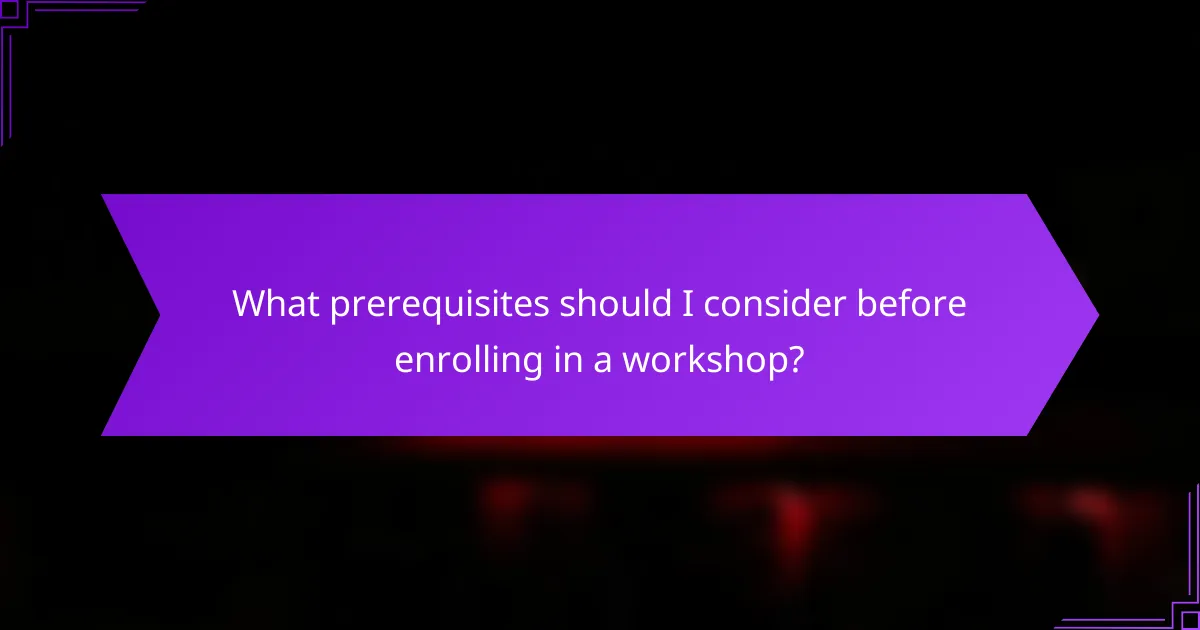
What prerequisites should I consider before enrolling in a workshop?
Before enrolling in a workshop, consider your existing knowledge, the time you can commit, and any specific skills you aim to develop. Understanding these prerequisites will help you choose a workshop that aligns with your goals and ensures a productive learning experience.
Prior knowledge requirements
Many workshops have specific prior knowledge expectations. For instance, a basic understanding of the subject matter may be necessary for advanced workshops, while beginner sessions typically require no prior experience. Review the workshop description to identify any recommended skills or knowledge.
It can be beneficial to assess your current skill level against the workshop’s requirements. If you’re unsure, consider reaching out to the instructor or organizer for clarification. This can prevent frustration and enhance your learning experience.
Time commitment
Time commitment varies significantly between workshops, ranging from a few hours to several weeks. Some workshops may require weekly sessions, while others are intensive, full-day events. Check the schedule to ensure you can dedicate the necessary time without conflicts.
Additionally, consider the time needed for any assignments or practice outside of the workshop sessions. Allocating extra hours for homework or project work can greatly enhance your understanding and retention of the material.
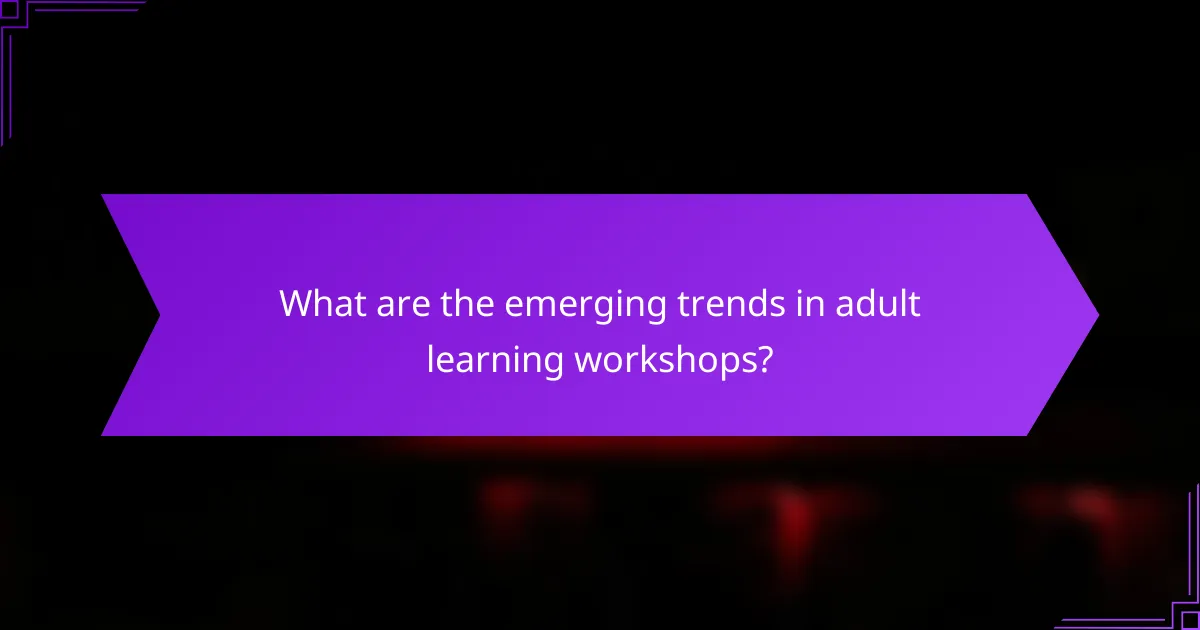
What are the emerging trends in adult learning workshops?
Emerging trends in adult learning workshops focus on personalized learning experiences, technology integration, and collaborative environments. These trends aim to enhance engagement and effectiveness in skill development for adults across various sectors.
Personalized Learning Experiences
Personalized learning experiences allow participants to tailor their educational journey according to their individual needs and goals. This approach often involves assessments to identify skill gaps and customized content that addresses those specific areas.
For example, workshops may offer different tracks based on skill levels or interests, enabling learners to progress at their own pace. This flexibility can lead to higher satisfaction and better retention of knowledge.
Technology Integration
Technology integration in adult learning workshops includes the use of online platforms, mobile apps, and interactive tools to facilitate learning. These technologies can enhance accessibility, allowing participants to engage with materials anytime and anywhere.
Utilizing virtual reality or gamification can also make learning more engaging. For instance, simulations can provide hands-on experience in a risk-free environment, which is particularly beneficial in fields like healthcare or engineering.
Collaborative Learning Environments
Collaborative learning environments encourage interaction among participants, fostering peer-to-peer learning and networking. Workshops that emphasize group activities or discussions can enhance critical thinking and problem-solving skills.
Incorporating team projects or case studies can simulate real-world challenges, making the learning experience more relevant. This approach not only builds skills but also strengthens community ties among participants.
